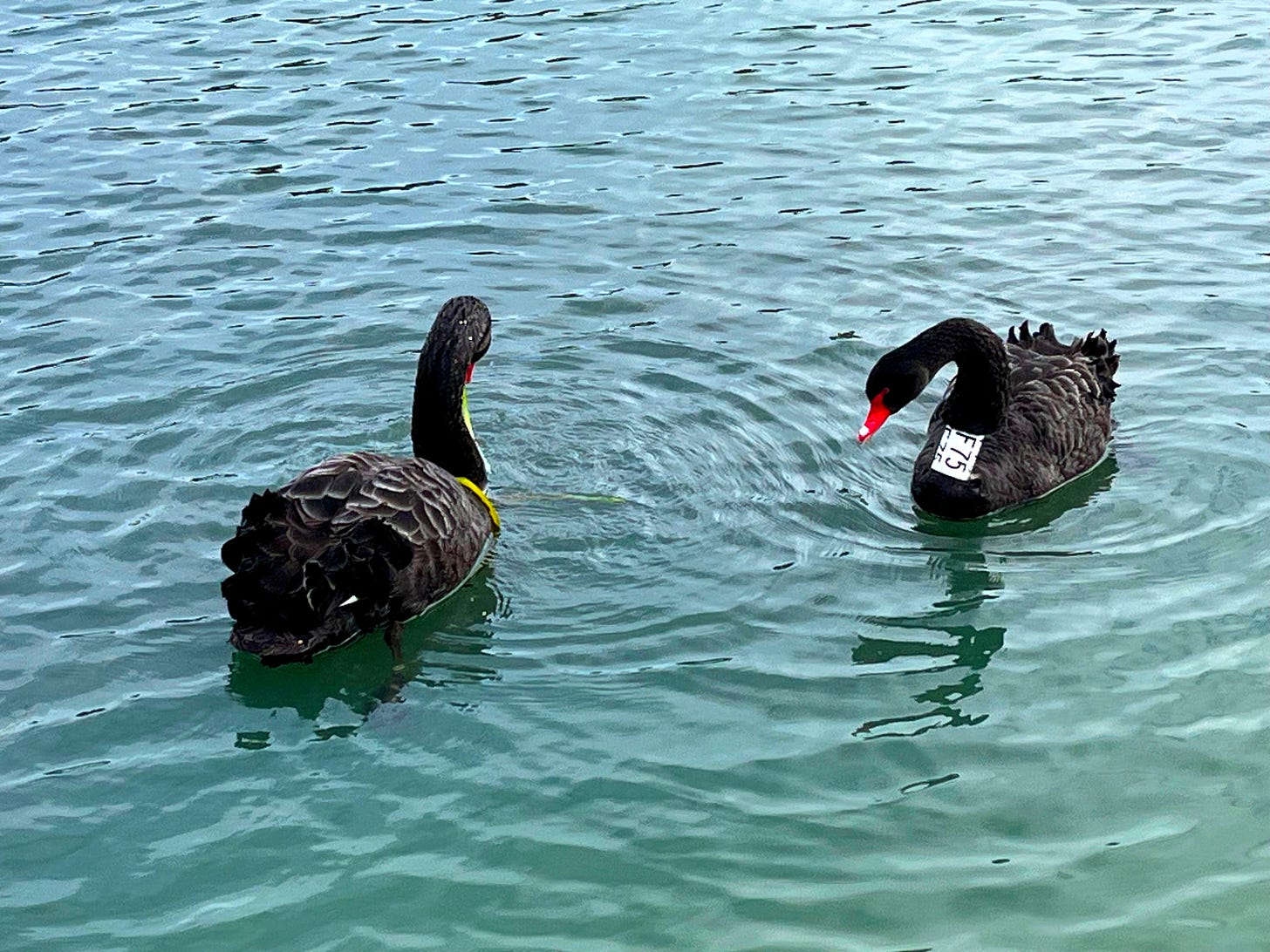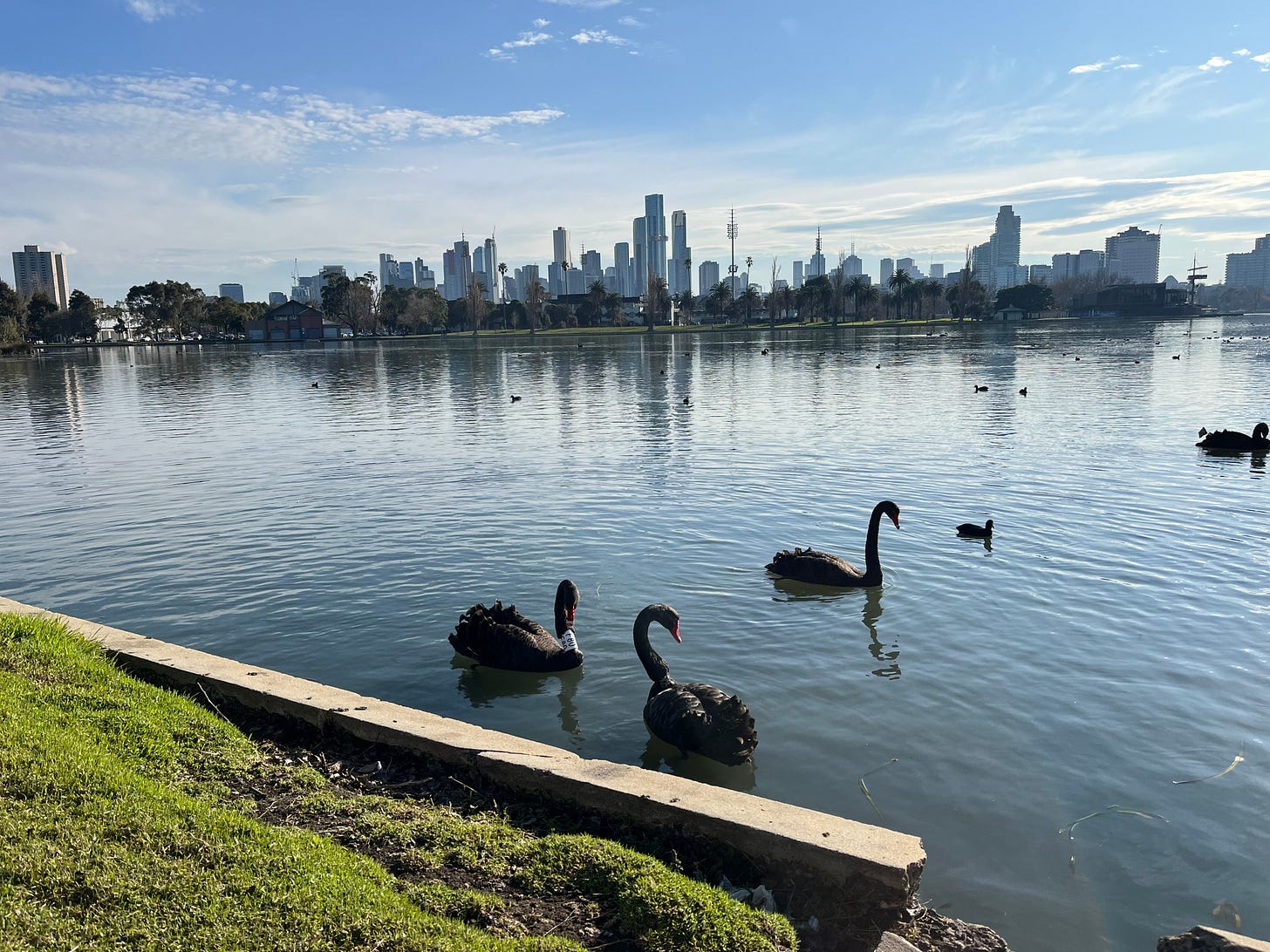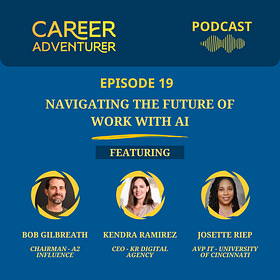Black Swan Thinkers Will Flourish
Challenging commonly held beliefs is critical for success in life and career
One of my favorite Kelley MBA classes was part of the first semester core curriculum. 20-years ago, my fellow MBAers and I spent the first term learning marketing, ops, finance, and strategy basics. Yet, none of these subjects has helped me more than the critical thinking component taught by an ex-attorney turned IU professor.
I entered B-school expecting to learn the finer points of brand marketing, corporate finance, and business strategy. I did not expect to be taught the ins and outs of fallacious reasoning. Recently, I was reminded of the importance of this course, especially in a GenAI world.
A Summer Down Under
We’ve been spending the summer in Australia for my wife’s job. When we first arrived “Down Under”, I came across Albert Park. It’s a large, beautiful park just a few kilometers from Downtown Melbourne. It’s a great place to enjoy a sunny day stroll and take in gorgeous views of the skyline. For me, its been a summer training ground for the Run Melbourne Half Marathon.
Like many iconic metro parks, Albert Park has a giant lake. As you’d expect, birds and people flock to the watering hole. Birds seek sustenance. People seek serenity.
Unlike most iconic metro parks, Albert hosts a Formula One race each year, the Australian Grand Prix. Yet, this isn’t what made the park stand out in my mind. It was the hundreds of black swans that cooly swim in the H2O.
Imagine Believing All Swans Are White
Take a moment to imagine you are a European explorer. You’ve been chartered to head to Australia. Claim riches. Expand the empire. Leaving Europe, your friend tells you absolutely, unequivocally ALL SWANS ARE WHITE! No exception.
As a well traveled explorer, you aren’t so sure. Common knowledge is that all swans are white, but you’ve seen some shit. You just got back from another treasure cruise to South America. One of your attendants was eaten by a crocodile in a river you thought was a great sea. You know some pretty funky creatures exist. You aren’t sure what other swans exist, but are pretty sure his absolute claim can’t be true.
Imagine your elation when your faith is proven correct. You hit Western Australia, drunk from many days at sea and the IPAs that took you there.
After claiming the land for God and country, never mind the native inhabitants who happily tended the land before you, you set off to find the nearest spring.
You summit some sand dunes and marshes when Eureka…fresh water! Finally your thirst can be quenched with something other than hoppy brown booze. But, you get far more than a refreshing sip of agua. You see thousands of black swans.
“Amazing!” you exclaim. Assuming you survive the return voyage, you’ve got a quite the story for your mates back at the pub: You’ve disproven the rule that all swans are white!
Black Swan Fallacy
Until Dutch explorer Willem de Vlamingh documented them in his 1697 expedition to Western Australia, Europeans believed that all swans were white. Talking about the black swan was merely a way to say something was impossible. Until Vlamingh’s black swan event, that is.
We discussed dozens of fallacies in my MBA critical thinking class. To name a few, there are:
Straw man fallacy - One misrepresents another’s argument and then refutes the distorted version.
Appeal to authority - The claim something is true simply because an authority figure said or claimed it.
False cause - When one incorrectly assumes one event causes another simply because it came first.
However, my favorite has always been black swan fallacy.
Black swan fallacy is when one ignores evidence that contradicts their beliefs or assumptions. It’s basically when you stick your head in the sand and ignore the evidence smacking you in the face.
Black Swan is Critical in Any Era
Black swan thinking is especially important as you think about navigating life and career today. A few weeks back, I talked about the future of work with a few senior leaders. Beyond AI skills, critical thinking and decision making took center stage in our discussion.
Episode 19: Navigating the Future of Work With AI
What does the future hold? It’s a question that’s been asked for eons by rulers, philosophers, and farmers alike.
Today, GenAI is smacking all of us in the face. It’s bringing to light the dangers of succumbing to black swan fallacy.
For example, maybe you’ve been in an industry for decades, surviving in good times and bad. To you, GenAI may just be ‘flash in the pan’. You’ve survived high and low career tides. Why wouldn’t you survive the current one? You might consider looking at the horse and buggy industry once the Model T was invented. We ride horses primarily for pleasure now.
You could also consider the trust you are putting in LLMs like ChatGPT, CoPilot, etc. You are choosing to have the LLM “think” for you whenever you use it. The LLM is using massive amounts of known data it has been trained on to guide you.
This puts the LLM at risk for assuming generally accepted norms as gospel. Theoretically, an LLM world requires people to identify black swan events to ensure the algorithms are reliable, especially as we all embrace these engines further.
One might conclude that it behooves all of us to do our best thinking and work outside of LLMs. When honed thoughtfully, our minds are powerful tools that can be put to use in identifying black swan events.
Continuously Challenge Thinking
I use ChatGPT routinely. It helps me like a dog helps a hunter. I tell it to find something. I then use my brain on whether or not I should trust it. In my career as a business strategist and career guru, I still take the helm on the highest level thinking. Lessons from my critical thinking class are still some of the most applicable today.
Reading clever critical thinking books helps me work out my mind. It keeps it sharp when faced with all of the assumptions life presents. Here are three that I routinely look back to for guidance or a laugh from time to time. Two are comedic escapes that poke fun at fallacies we often hear. One is all about irrational psychology in the business realm.
Plato and a Platypus Walk into a Bar by Thomas Cathcart - Hilarious philosophical breakdown of jokes, one-liners, sayings, poems, and more. A reliable pre-bedtime reading for me.
Aristotle and an Aardvark Go To Washington by Thomas Cathcart and David Klein - Politicians love praying on our assumptions with tongue twisting talk that is filled with fallacious reasoning. Will make you chuckle while honing your mind.
Predictably Irrational by Dr. Dan Arielly - Uses common business challenges and predicaments to show how often irrational behavior guides humans.
Pick up one of these books! You won’t regret it.
Thanks for reading!
Paul G. Fisher
Worth Additional Reading - Critical Thinking in Action
Katy Milkman writes Milkman Delivers. She is a behavioral science professor at the University of Pennsylvania. I came across her thinking at The Market Research Event last December. She talked about how our decisions are influenced by the choice architecture presented to us.
I found her recent article extolling a book by Dean Spears and Mike Geruso called After the Spike to be a great example of critical thinking in action. For decades, we’ve assumed that population growth will continue unabated. We’re at 8 billion people. Of course we’ll hit 10B, right?! Probably, but where does it go from there?
Dean and Mike challenge that assumption simply by digging into the math. I’m looking forward to reading their book!






You wrote about black swans, and didn't even mention "The Black Swan" a best-selling book by Nessim Nicholas Taleb?
One of my favorite quotes from The Black Swan popped for me today:
"Nobody would pay one dollar to buy a series of abstract statistics reminiscent of a boring college lecture. We want to be told stories, and there is nothing wrong with that—except that we should check more thoroughly whether the story provides consequential distortions of reality."